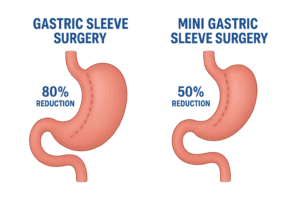Bariatric surgery is a medical procedure that helps people lose weight by changing their digestive system. It’s becoming more popular as a way to deal with obesity and its related health problems.
When considering this surgery, many look at before and after photos to see the results. These pictures can play a big part in deciding to proceed with the surgery.
However, only some of these photos are honest. Some can be misleading, showing results that might not be true for everyone.
Renew Bariatrics a bariatric surgery provider located in Tijuana, Mexico is here to help you understand how to spot those misleading before and after photos so you can make a more informed decision about bariatric surgery.
What is Bariatric Surgery?
Bariatric surgery helps you lose weight. It works by making changes to your stomach, intestines, or both. This can help you eat less food or absorb fewer calories.
People usually consider bariatric surgery when other ways to lose weight haven’t worked for them. There are different kinds of bariatric surgery. Some common types are gastric bypass, sleeve gastrectomy, adjustable gastric band, and biliopancreatic diversion with duodenal switch.
Each type has its own way of helping you lose weight. It’s important to know that bariatric surgery is a big step. It can lead to significant weight loss and help with diseases related to being overweight, like diabetes and heart disease. But, it also requires a commitment to a healthy lifestyle after the surgery to keep the weight off.
Why Before and After Photos in Bariatric Surgery are Important
Bariatric surgery before and after photos are often used by doctors and clinics to show the results of bariatric surgery. These pictures can be very powerful. They show real examples of how much weight people have lost after the surgery. For someone thinking about having the surgery, these photos can be a big motivation. They can help you imagine what your results might look like.
However, these photos do more than show weight loss. They can make you feel more confident about the surgery. Seeing the positive changes in others can make the surgery seem more appealing. Doctors and clinics know this. That’s why they often use these photos in their advertisements and on their websites.
How to Identify Deceptive Practices
Some before and after photos might not be honest. They can be altered to make the weight loss look more impressive than it is. There are a few tricks that can make these photos misleading.
For example, the lighting in the before photo might be dim, making the person look bigger. Then, in the after photo, bright lighting can make the person appear slimmer. Changes in clothing, like wearing tighter clothes in the after photo, can also make the weight loss seem more dramatic. Some photos might even be edited to change the person’s size.

Example of Stock Photography Before and After
How to Identify Fake Bariatric Reviews Using Stock Photos
Identifying deceptive before and after photos using stock photography sites is vital to ensure you’re getting high-quality, genuine reviews when considering bariatric surgery. Here are some tips to help you spot fake reviews:
Spot Stock Photos
Fake reviews often use generic images from stock photography sites. If you see a before-and-after photo that looks a bit too perfect, try doing a reverse image search. If the image pops up on various websites unrelated to bariatric services, it’s likely a stock photo.
Look for Personal Details
Genuine reviews often include specific details about the person’s experience, such as their challenges or how the surgery changed their life. If the review lacks personal insight and feels generic, it might be fake.
Check Multiple Platforms
Genuine reviews are usually consistent across different websites. If you find a review on a clinic’s website, see if the same person has shared their experience on social media or forums. Discrepancies or the absence of reviews elsewhere can be a red flag.
Review the Reviewer’s History
If the platform allows you to see the reviewer’s history, take a look. If they have only posted one review or all their reviews seem overly positive and vague, question their authenticity.
Assess the Emotional Depth
Weight loss surgery is a significant life event. Real testimonials often convey emotions, struggles, and triumphs. If a review reads like an advertisement without any personal touch, be skeptical.
Watch Out for Repetitive Language
Fake reviews may use similar phrases or sentences across different testimonials. If you notice a pattern in language or overly promotional language, it’s worth questioning the review’s legitimacy.
Use Reverse Image Searches
For any before-and-after photos or images of supposedly satisfied patients, use reverse image search tools to see if these images appear elsewhere. Real patients often share unique images not found on stock sites.
Red Flags to Watch For
When you look at before and after photos of bariatric surgery, pay attention to a few warning signs that the photos might not be honest.
First, look at the background, lighting, and how the person stands in both photos. If there’s a big difference, the photos might be trying to trick you. For example, if the before photo is dark and the person looks unhappy, but the after photo is bright and they’re smiling, it might not just be the weight loss making the difference.
Another red flag is when there’s no information about the person’s health journey. Real weight loss includes changes in diet, exercise, and lifestyle. If the photos don’t talk about these, they might not be showing the full picture. Also, if the results look too perfect, like something from a magazine, be careful.
Why Realistic Expectations Are Vital
When thinking about bariatric surgery, it’s key to have realistic expectations. Every person’s body is different, and so are the results of the surgery. Some might lose a lot of weight quickly, while others might lose it more slowly. Also, the surgery is just one part of weight loss. Eating healthy foods and being active are also important to keep the weight off.
Related: Check Your Estimated Weight Loss with our Bariatric Weight Loss Calculator
Remember, bariatric surgery is not a quick fix for obesity. It’s a tool that can help you lose weight, but you also need to work on changing your lifestyle. This includes following the diet and exercise plan your doctor gives you.
Also, weight loss can bring big changes to your life. It can improve your health and make you feel better about yourself. But it’s also a big change that can take time to get used to. Being prepared for these changes can help you make the most of your surgery.
Considering Weight Loss Surgery?
Contact Renew Bariatrics in Mexico today if you are considering more information about weight loss surgery and to see if you are a candidate.





